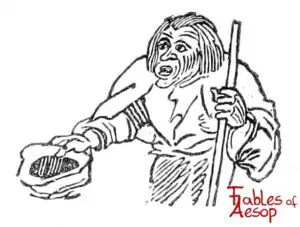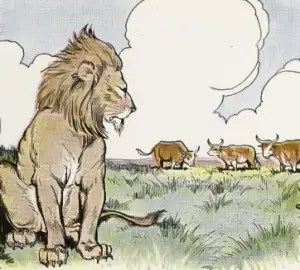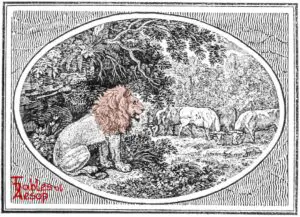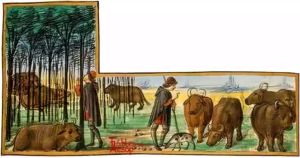A Lion wanted to dine on some bulls but they grouped together when he advanced. One day the bulls went to different fields and were eaten one by one.
Union is strength.
(Note: Other authors say: The Four Oxen and The Lion.)

Eliot/Jacobs Version
A Lion used to prowl about a field in which Four Oxen use to dwell. Many times he tried to attack them but whenever he came near they turned their tails to one another so that whichever way he approached them he was met by the horns of one of them. At last, however, the Oxen argued among themselves, and each went off to pasture alone in a separate corner of the field. The Lion then attacked them one by one and soon made an end of all four.

Aesop For Children (Three Bullocks and a Lion)
A Lion had been watching three Bullocks feeding in an open field. He had tried to attack them several times, but they had kept together, and helped each other to drive him off. The Lion had little hope of eating them, for he was no match for three strong Bullocks with their sharp horns and hoofs. But he could not keep away from that field, for it is hard to resist watching a good meal, even when there is little chance of getting it.
Then one day the Bullocks had a quarrel, and when the hungry Lion came to look at them and lick his chops as he was accustomed to do, he found them in separate corners of the field, as far away from one another as they could get.
It was now an easy matter for the Lion to attack them one at a time, and this he proceeded to do with the greatest satisfaction and relish.
Moral
In unity is strength.

Thomas Bewick (The Lion and The Four Bulls)
Four Bulls, who had entered into a very strict friendship, kept always near one another, and fed together. The Lion often saw them, and as often had a mind to make one of them his prey; but though he could easily have subdued any of them singly, yet he was afraid to attack the whole alliance, knowing they would have been too powerful for him, and therefore was obliged to keep himself at a distance. At last, perceiving that no attempt was to be made upon them as long as their combination lasted, he artfully contrived, by the whispers and hints of his emissaries, to foment jealousies, and raise divisions among them. This stratagem succeeded so well, that the Bulls grew cold and reserved to one another, which soon after ripened into a downright hatred and aversion, and at last ended in a total separation. The Lion had now attained his ends; and though it had been impossible for him to hurt them while they were united, he found no difficulty, now they were parted, to seize and devour every Bull of them, one after another.
APPLICATION.
Since friendships and alliances are of the greatest importance to our well-being and happiness, we cannot be too often cautioned against suffering them to be broken by tale bearers and whisperers, or by any dark plots and contrivances of our enemies: for when by such wicked means as these, or by our own imprudence, we lose a friend, we shake the very basis of our interest, and remove the pillar that contributed to support it. Whatever in cases of this kind is applicable to individuals, is equally so to kingdoms and states; and it is as undisputed a maxim as ever was urged upon the attention of mankind, by the best man that ever lived, that a “kingdom divided against itself cannot stand:” the people are invincible when united.
Faction and feuds will overturn the state
Which union renders flourishing and great.


Townsend version
Three bulls for a long time pastured together. A Lion lay in ambush in the hope of making them his prey, but was afraid to attack them while they kept together. Having at last by guileful speeches succeeded in separating them, he attacked them without fear as they fed alone, and feasted on them one by one at his own leisure.
Moral
Union is strength.

Gherardo Image from 1480

Leo et Tauri Duo
In duos tauros leo faciebat impetum, lautas sibi epulas quaerens. Illi, coniunctis viribus, opponunt cornua, medios ne irruere possit leo. Duobus ergo impar leo viribus, dolo agere coepit, sicque est allocutus alterum, “Amicum tuum si prodideris mihi, incolumem hinc ego te dimittam.” Qua usus fraude, facili utrumque necavit negotio.
Perry #372


